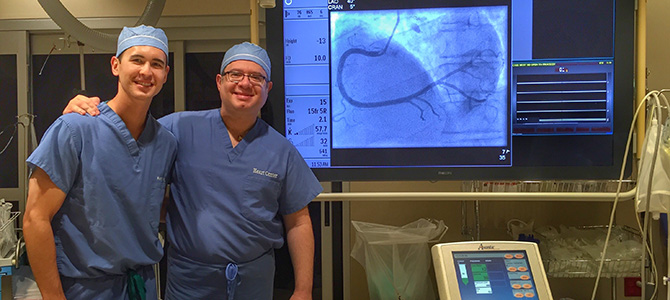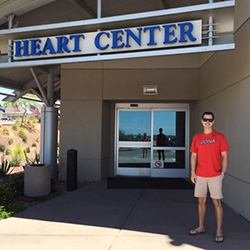
Rural Health Program Addresses Physician Shortage

Second-year medical student Carl Goff is proud of his rural roots in Prescott.
So when he returned this summer to spend four weeks as part of his requirements for the Rural Health Professions Program, it was a happy homecoming.
“Every day I ran into someone who was connected to my family or my past career as a paramedic,” Goff said. “I would highly recommend this program. In a professional context, having the opportunity to be unopposed as a medical student is really exciting, and I also enjoyed having the opportunity to treat friends, family and serve a community of people I really know.”
The University of Arizona College of Medicine – Phoenix started the Rural Health Professions Program Certificate of Distinction as a way to inspire medical students to practice in a rural setting. It also is a way to address the shortage of physicians in rural and underserved areas.
The program is open for all first-year medical students. This year’s deadline to apply is Oct. 1, 2016.
“The ultimate goal is to produce more rural physicians,” said Sara Hillman, assistant director of the college’s Rural and Underserved Programs. “We want to expose more of our medical students to the barriers of rural populations and show them the benefits of working in a rural setting.”
The certificate requires students to attend a seminar series, complete a scholarly project on a subject relevant to rural health, participate in a four-week summer rural pre-clinical experience and a 19-week rural clerkship that exposes them to internal medicine, family medicine, pediatrics and surgery.
“This is a great opportunity for students,” Hillman said. “Students get more autonomy, they get a broad scope of patients and procedures and more hands-on experience.”
Hillman said the feedback she has received from students is that they love the program. As a result, awareness on campus is growing.

Kishi spent 15 weeks in Yuma during his third-year, seeing patients with a wide range of conditions. He also participated in advanced cardiac procedures and was able to spend time to truly connect with the community.
“This was a great opportunity that allowed me to experience a different face of medicine,” Kishi said. “I was able to work closely with physicians who were excited to have a new student and eager to teach. They provided an exceptional educational experience.”
Students may be sent to complete their clerkship experience in rural areas such as Yuma, Lake Havasu, Prescott, Sedona, Flagstaff, Page, Williams, Show Low, Lakeside, Snowflake, Florence, Morenci, Silver City, NM, and Deming, NM.
Any student can complete a four-week rural Internal Medicine Outpatient rotation or a six-week rural Family Clerkship rotation during their third-year. Students participating in the Certificate of Distinction will complete 19 weeks in internal medicine, family, pediatrics and surgery. Housing, mileage and a stipend are provided to the students, and the program is supported by Arizona Area Health Education Centers.
Hillman said the program’s goal is to identify students who will find a passion in helping underserved rural populations. Hopefully, those students will return to practice in these communities.
Overall, the certificate program has 11 students enrolled: three from the class of 2017, three from the class of 2016 and five from the class of 2019.
About the College
Founded in 2007, the University of Arizona College of Medicine – Phoenix inspires and trains exemplary physicians, scientists and leaders to advance its core missions in education, research, clinical care and service to communities across Arizona. The college’s strength lies in our collaborations and partnerships with clinical affiliates, community organizations and industry sponsors. With our primary affiliate, Banner Health, we are recognized as the premier academic medical center in Phoenix. As an anchor institution of the Phoenix Bioscience Core, the college is home to signature research programs in neurosciences, cardiopulmonary diseases, immunology, informatics and metabolism. These focus areas uniquely position us to drive biomedical research and bolster economic development in the region.
As an urban institution with strong roots in rural and tribal health, the college has graduated more than 1,000 physicians and matriculates 130 students each year. Greater than 60% of matriculating students are from Arizona and many continue training at our GME sponsored residency programs, ultimately pursuing local academic and community-based opportunities. While our traditional four-year program continues to thrive, we will launch our recently approved accelerated three-year medical student curriculum with exclusive focus on primary care. This program is designed to further enhance workforce retention needs across Arizona.
The college has embarked on our strategic plan for 2025 to 2030. Learn more.